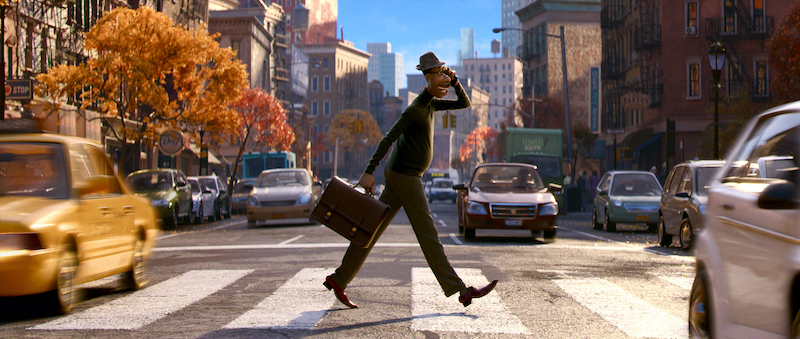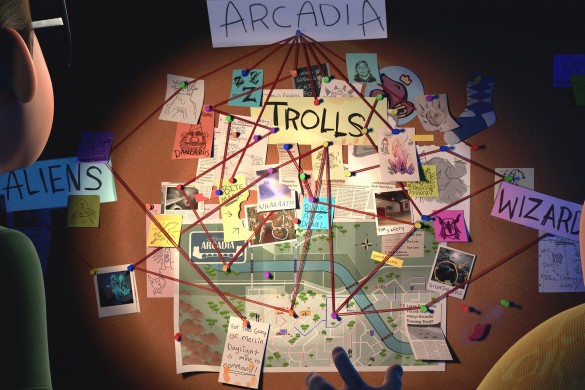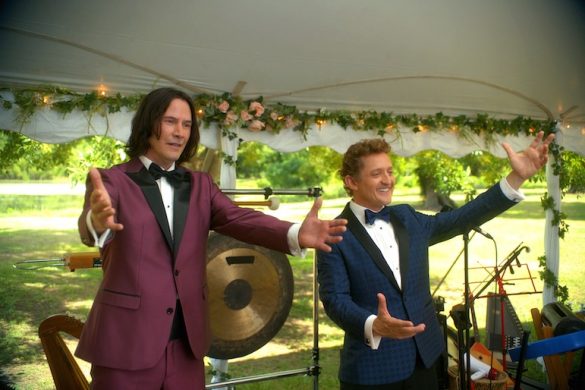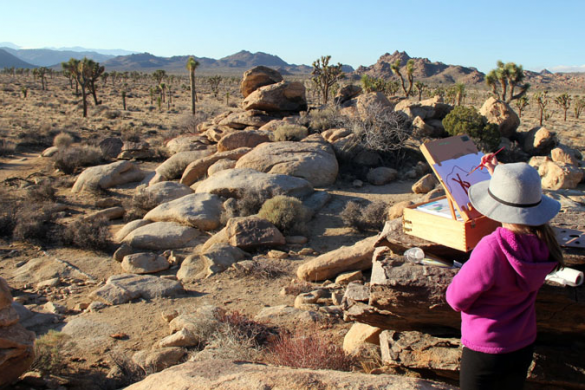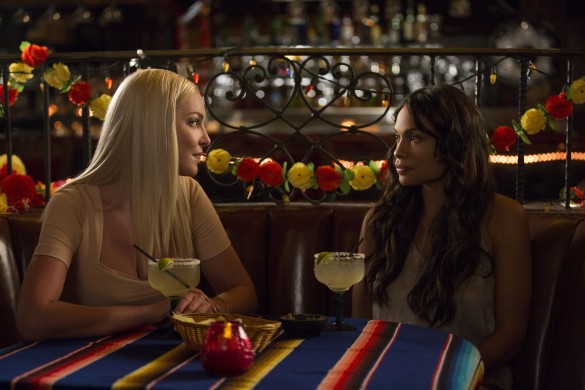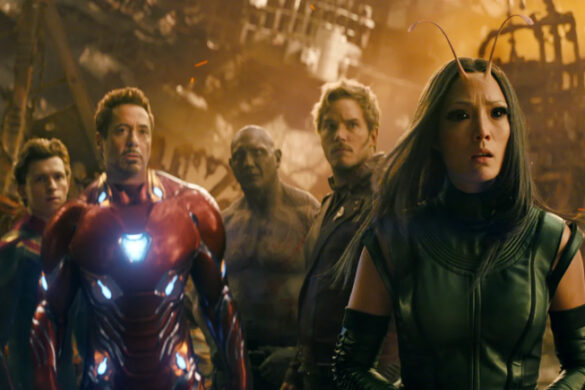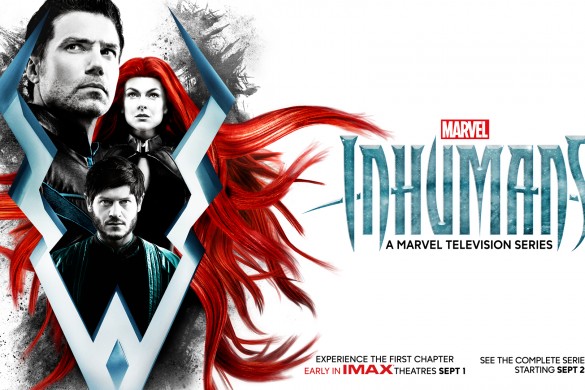Conceptually, Pixar’s Soul is a celebration of human individuality in a fun way and fits into the studio’s principles of putting forth a strong story into their animated filmmaking. But Pete Docter’s latest film then takes it a step further with the help of co-writer and co-director Kemp Powers by making it the studio’s first Black feature film with a Black story and a predominately Black cast. Drawing from his own experiences in life, Powers provided the film with a story that would be authentic. At the same time, Docter added an existential twist by exploring where the individual’s focus should be and why said individual would spend their limited time on Earth concentrating on such a specific thing.
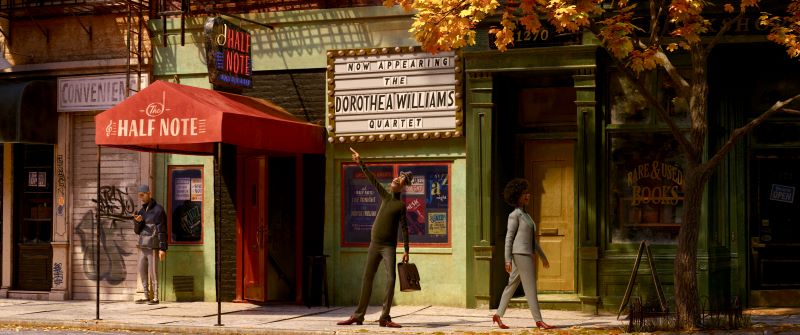
ThatsItLA had a chance to participate in a virtual press conference with Docter and Powers and producer Dana Murray and cast Jamie Foxx, Tina Fey, Phylicia Rashad, and Angela Bassett. During the press conference, they talked about the inception of the film, what they hope audiences take away from watching it, and what they like on their pizza. Here are the top ten things they said.
1 – “Soul” Inception
At first, Soul was going to take audiences to a place where they have never been before. Indeed, we’ve seen where other films have explored the afterlife and limbo, but we’ve never seen a film reveal where our souls come from and how it helps shape us into the people we are today. Docter asked himself existential questions about who we are and what we are meant to do on this Earth. He then discovered that he could hone in on that story if the lead character were a jazz musician because of their genuine love of the art.
“You don’t go into jazz to get rich and famous, you know? You do it because you love it. And you have a passion for it. And it’s fascinating to watch. When you see somebody play, they’re just amazing,” Docter said. The idea of making the character black came from one of the film’s consultants, who called jazz, black improvisational music.
Because “Soul” was going to be a Black film, Pixar needed a creative team that would be a reflection of its onscreen characters, thereby bringing audiences a story that felt authentic and honest. And that’s when Murray put together a group of consultants and how they contacted Powers to help craft the story.
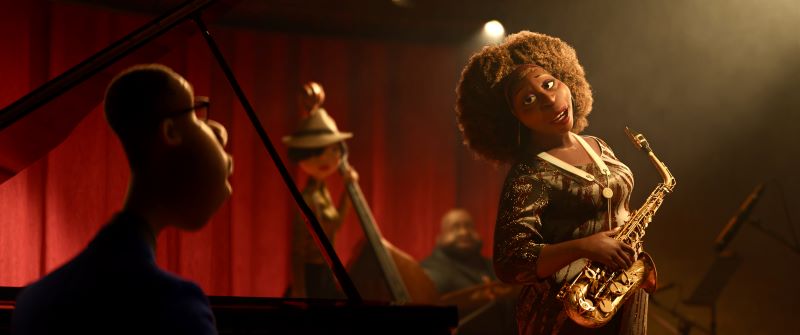
2 – “Soul” Inspiration
Powers is a playwright who’s written words speak to the Black experience. Though he knows that his works and experience don’t encapsulate the entire Black culture, it can make a connection because he’s lived those moments and shared those experiences. And when Docter and Murray approached him about writing the script, he had to ask if they were familiar with his politics and if they knew what they were getting into if they brought him on board.
Though Hollywood’s culture is changing where audiences are craving for more stories of diversity, there are still a few artists who feel that more needs to be done, especially with the gatekeepers who greenlight these stories into production. But Powers knew that any piece of work could be successful those same gatekeepers could see its potential. “You know that I’m gonna be pushing for, like, a lot of black stuff. Because I can’t help myself. Like, I think, our culture is amazing. And a lot of people, particularly in Hollywood, will tell you that, in order to appeal to a wide audience, you want to get away from that,” Powers said. “And I feel the opposite. I feel like there is universality by going for hyper specificity. My number one defense is, do you not enjoy Sopranos and The Godfather if you’re not Italian? That sounds absurd, right?”
So even though the story may be culturally or even domestically specific, there are certain aspects to it that speak to humanity. But seeing those nuances from where you get your hair cut and the music you listen to, to the body language proves why representation matters. Docter and Murray encouraged Powers not to shy away from any of that. And that came as a shock to Powers, who often asked himself if they were going to be able to tell this kind of a story or say things like “jazz is black improvisational music.” These specificities didn’t hurt the film. It only enhanced the watching experience. “I don’t think it hurts the film at all,” Powers said. “I think it’s part of what makes the texture of this film so rich and-and honest and sincere.”
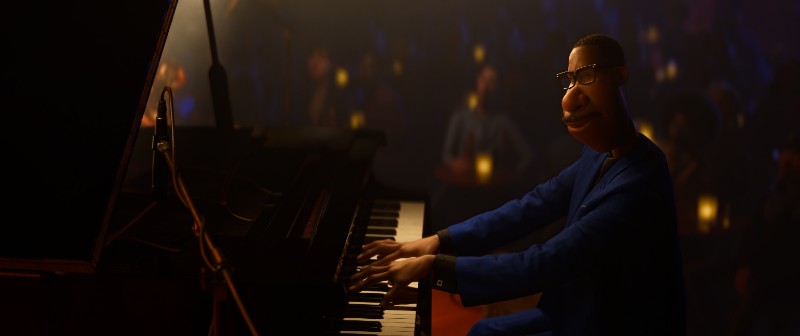
3 – Having A Diverse and Cultured “Soul”
But bringing that kind of diversity to “Soul” meant much more than attaching an acclaimed playwright like Powers to the creative team. Murray knew that the film would need to go beyond that to be true to the Black experience. So Murray would have to assemble a dream consulting team by referring to the Head of Diversity and Inclusion at Pixar. And she brought in Black people from all walks of life from Dr. Johnetta Cole, “Hamilton” and “Soul” co-star Daveed Diggs to Late Night with Stephen Colbert musician Jon Batiste, Ryan Kuebler, cinematographer Bradford Young, Questlove, and more.
Murray said “the depths of the bench was crazy” as they also consulted with jazz musicians and teachers in New York City, where the film is set, and in Emeryville, where Pixar is headquartered. “We brought together the black employees and Pixar and created a trust as well. And so, they were a part of the daily process. You know, where the outside consultants were more on the monthly.”
Murray also credits “Soul” lead star Jamie Foxx for developing the film’s voice by speaking to the animation team. “He’s a genius. He came to Pixar quite a bit to speak to our crew and the animators, and brought a lot of life to Joe’s character as well,” she said.

4 – Developing “Soul” World (The Great Before and The Hall of Everything)
In “Soul,” the very essence of a human’s individuality unique personality comes from a place called “The Great Before.” It’s the kind of great cosmic place that was never explored or brought to the bring screen. So bringing that place to life in a believable way yet authentically Pixar wouldn’t be easy. “We started by look, because, a lot of the underpinnings of the story are very philosophical,” Docter said. “We looked at ancient Greece, and we were picturing large fields where you’d stand where Plato would pontificate or whatever.”
While that would have been picturesque, there were some issues if they based ‘The Great Before’ entirely on the Greek culture in a Black film. “We don’t want it to be specific to any culture, Docter said. “Because everybody around the world started here. So, it can’t be, uh, culturally specific.” So they looked at images from the World’s Fair of the 40s and 60s, where the buildings are there “to inspire and be austere.”
Kemp added that they were also inspired by museum exhibits that would give a detailed history of a character’s life and recreate it in a very fun and Pixar way. Bringing this idea to the screen also had a lot of comedic potentials because it would allow the audience to see the great differences between two people like a noble prize winner and someone as unassuming as Joe.

5 – Getting Into Character
In “Soul,” Joe (voiced by Jamie Foxx) is a mild-mannered middle school jazz teacher with a dream to play at one of New York City’s top jazz venues. As such, it needed to be voiced by a character who has similar goals and experiences. Coming from a music background, Foxx spoke about the jazz cats that shape his love for jazz music. From Thelonious Monk, Jon Baptiste, Marvin Gaye, Miles Davis, and Charlie Parker, and Ray Charles, to the smaller but still very talented musicians from his hometown like Gary Johnson, and Pass, would play for the love of music and not the money.
“They didn’t even realize that they could probably go play somewhere and actually get paid for it,” Foxx said. “But that’s what you listen to when you vibe out to it.” The actor recalled how Harvey Fuqua, who also happened to be Marvin Gaye’s manager, discovered him while in college at International University on a classical piano scholarship.
“Our first conversations was about jazz. From Charlie Parker, you know what I’m saying, to Miles, that he actually had an opportunity to-to hang out with,” Foxx said about a conversation he had with Gaye. “And he talked about how great jazz was. Because it’s as many notes as you want, as many notes as you can-as-as many notes as you can fill in. Which, you know, these guys were masterful at that. And he talked about how masterful you must be to become to rise to the top of the jazz world. Because if you think about it, music is only from that C note to that B note. And then, it repeats itself.”
6 – Advice to Young Black People
Of course, being the prominent Black actor that he is, there are many aspiring artists who are looking to break into the industry but still aren’t quite sure how to make that first step.
And though they may be unclear about it or even frustrated that they aren’t making any headway towards their dreams, Foxx has some advice for those looking to get into the business. “What I tell them is, do not-do not fatigue,” he said. “Do not lay your art to the side. I talked to Michael B. Jordan, Chadwick Boseman, you know, I talked to everybody that comes in my house, I just say, hey, man, the opportunity is so wide open now.”
Foxx added:
“So, you got to run. You have to take advantage of it. Because I think about all of the different platforms. They didn’t have any platforms when we were coming up. I remember getting to LA and just, I was on Sunset Boulevard like, ‘okay. Should I get… Uh, which, I don’t know.’ There was no face time book, uh, snap crack nothing. So, now, you have it all. So, sometimes the artist, sort of, leans back and relies on just the social platform as opposed to pushing their art.”
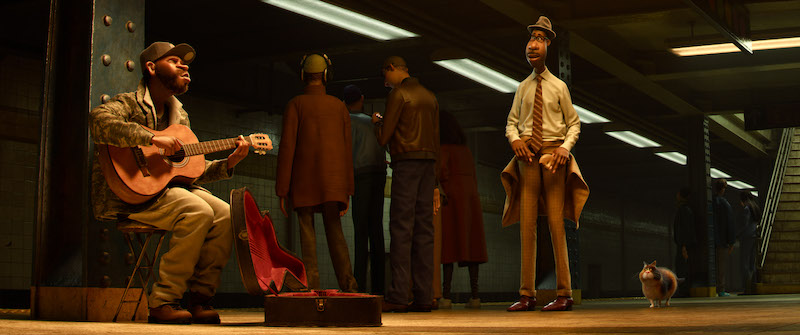
7 – Animating Culture
“Soul” is also one of the first major CG animated films to have a majority Black cast. Seeing a culture that has gone underrepresented for far too long means that artists and creatives are taking the necessary steps to bring forth meaningful representation onscreen. “It means a great deal, the more and more that we get these-these stories and these images and opportunities out there,” Angela Bassett, who plays revered jazz saxophonist Doretha William, said.” You know, we think of animation usually for the youngsters. But it’s also, you know, families are taking. So, if we just start early with these-these images and this idea that um, you know, that it’s vast and diverse humanity. I think it’s a great thing.”
8 – Animating Themes Of Life and Death
Docter is no stranger to directing Pixar films that explore deep and heavy themes that deal with human existence. “I think the film does a really interesting thing, where they go a step beyond just saying, ‘You’ve gotta find your passion in life,’ Tina Fey, who plays 22, said. “They also bring up the idea that an all-consuming passion can kind of overtake your life. And that it’s a bit about being present is as important as achieving.”
Fey sees this as an essential concept to take away from after watching “Soul,” especially when everybody’s way of life has changed due to the ongoing pandemic. “It’s a year when we’re all taking stock of like, what it means to have had a good year,” Fey said. “What it means to have been successful in your life. Uh, and it-it often now means taking uh, small joys where you can find them. And being present with the people that you love.”
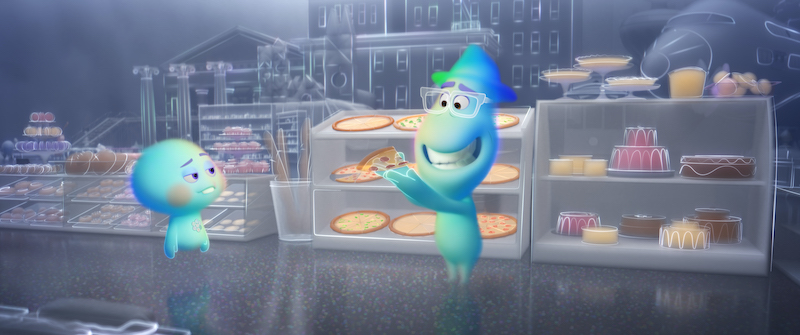
9 – Pizza, Pizza
But as heavy as “Soul” is, Pixar brings some levity through its innovative filmmaking technology, gorgeous animation, humor, and some tasty pizza. The delicious dish helps connect the world and its characters to its audience. And the cast share some of their thoughts on what should and should not go on a pizza.
Fey, who has lived in Chicago and New York, has had pizza in all of its forms, so she is open to both styles. But if she had to choose, she prefers plain. So, um, and then I also lived in Chicago. So, every form of pizza, um, I’m open to it.”
But then comes the highly controversial issue of does pineapples belong on pizza. Though I am a staunch supporter of the sweet topping being on a savory dish, some don’t like it. In fact, a lot of the cast would prefer not to have it on their pizza. “It’s not for me. I don’t wanna judge anybody that wants to do it,” Fey said. Bassett and Phylicia Rashad, who voices Joe’s mother, both said nay to putting pineapples on their pizza as well.
10 – It Matters
“Soul” addresses the importance of having dreams and putting in the hard work to achieve those dreams. At the same time, it also makes a point to have the dreamers realize that it’s important to be in the moment and not miss out on what life has to offer. Because as Kemp puts it, “all lives have merit.”
“It’s this idea that you don’t have to have it all figure out. You know, we have a society that from the time we’re very young, we’re really, kind of, taught to, like, make a decision, what do you want to be when you grow up,” Kemp said. “You know, that’s, like, first grade. You’re gonna be this. You’re gonna be that. You definitely have to do this.” If anything, a film like “Soul” teaches us the valuable lesson of not being so invested in trying to achieve those dreams.
And that sense of fulfillment comes through in a character like Dez the Barber. “Dez the Barber is a guy that is a master at his craft. He’s a master barber. To the point that Joe was like, obviously, he always wanted to do this,” Powers said. “And he’s like, nah, man. I wanted to be a vet. But I’m pretty happy with where I landed. I found other dreams.
Docter also chimed in with a variation of what Kemp had to say about the idea of living life and the concept of fulfillment. “I think, a lot of us, uh, grew up with this idea that we need to earn our way into being worthy,” he said. “That’s why some of these goals end up being, kind of, self-defining or self-limiting.”
“Soul” will stream exclusively on Disney+ starting on December 25, 2020.

